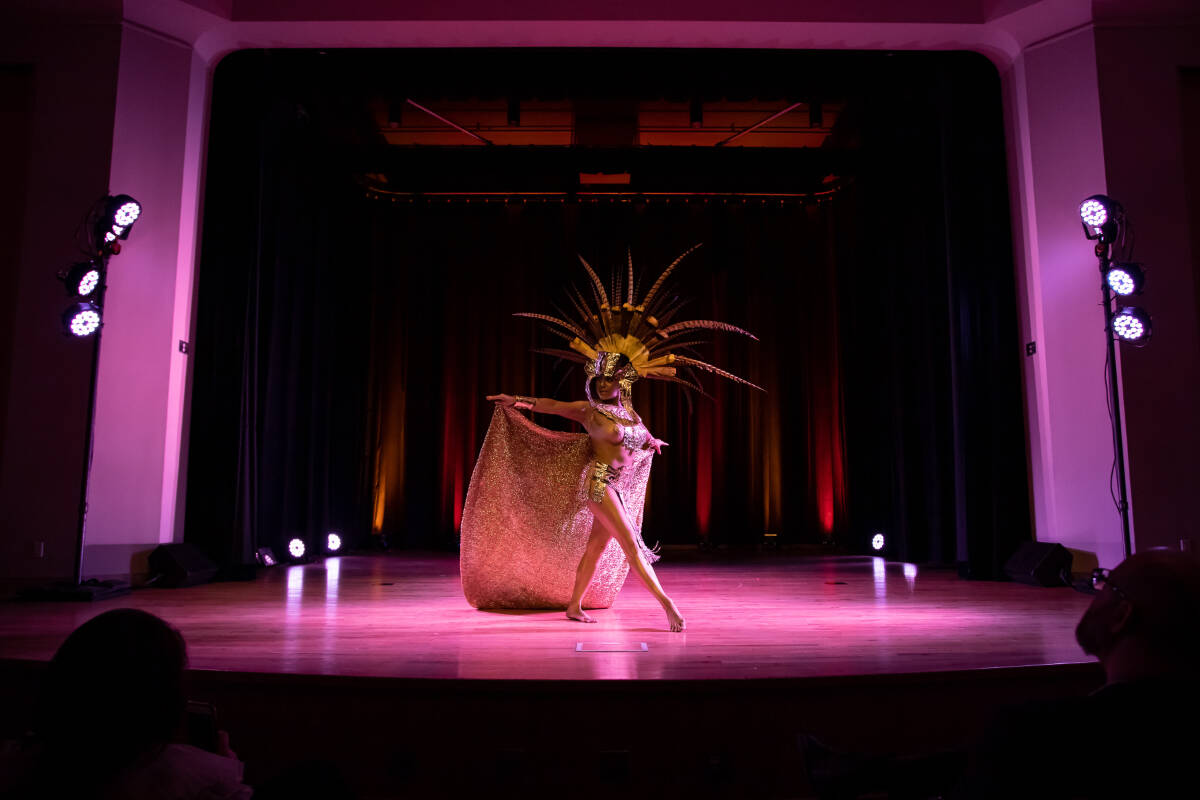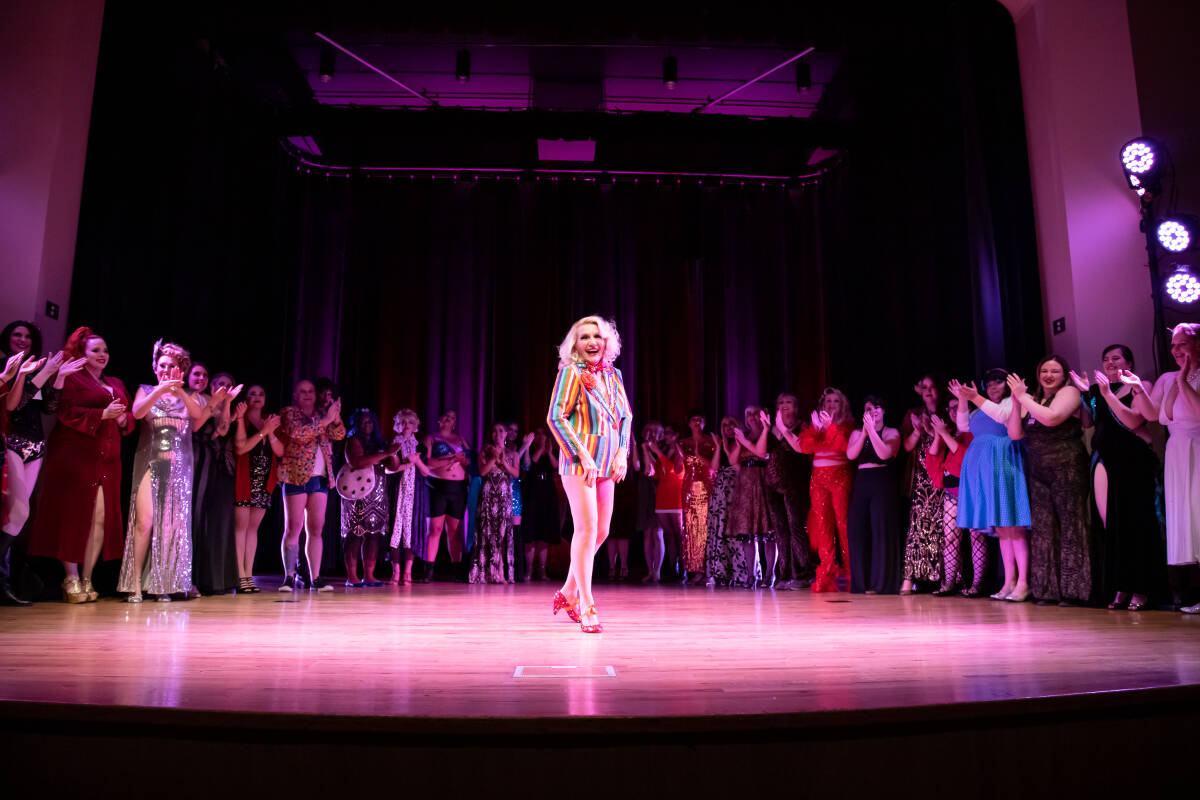Personal, political, powerful: the modern art of burlesque is not just about the glamour.
Take, for instance, Lou Lou La Duchesse De Riere from the Mohawk territory of Kahnawake, Quebec.
Appearing later this month at Victoria’s Isle of Tease Burlesque Festival, Lou Lou, aka Lauren Ashley Jiles, is an Afro-Indigenous internationally renowned neo-burlesque dancer, teacher, and activist who has been voted three times into the Burlesque Top 50 by 21st Century Burlesque.
She was also the focus of a VICE documentary made in 2018 on her aim to decolonize sexuality among First Nations women.
“I’m also a mother to a young girl so I think it’s so important that we have models of healthy sexual views on our body,” Jiles said on the phone. One of the things she loves most about burlesque is its celebration of sexuality and the human body.
“I grew up in a time where we didn’t even have the vocabulary for a lot of things that were happening to us. I am hopeful not just as an Indigenous woman, but as a woman in general that for future generations we’re really setting these kids up to speak for themselves, to know what consent and assault are, and also to live confidently and fearlessly and to live in their truth.”
Jiles’s outlook embodies a lot of the prevalent values in burlesque today, a “shift” that is happening on bigger stages, as she puts it. When Jiles first started burlesque 18 years ago, she remembers an interest in classic, glamourous, “glittery” acts.
“It’s a beautiful and valid way to perform burlesque but now we see so many amazing artists that are coming in with, not only the glamour, but these really powerful messages of self-love and defiance and social causes,” Jiles said.
“Burlesque has always been political and it’s always been radical but there’s an interesting shift happening right now. I think of it as really punk rock, defiant.”
Making a statement
When Jiles spoke openly in the VICE documentary on why she does burlesque, one thing she said gave a glimpse into her outlook on the power that she finds in it.
“I’m tired as an Indigenous woman, the only time I get to hear about my sexuality is in reference to being raped or murdered,” she said in the documentary.
Over a decade ago, Jiles admitted she was really “hesitant to visit those topics”. At one point, she attempted to do a satirical piece on fetishism and exoticism and “it really didn’t work.”
“Someone said, ‘What a fun Pocahontas act’. I felt like I wasn’t doing my job as an artist if the messages weren’t being clearly conveyed,” she said on the phone.
It wasn’t until she was in her early 30s that she decided she wanted to revisit bringing a strong cultural message into her art.
“In that time I was in college, and then I was a mom, a single mom and I got married, all these big life events and so much personal growth in that time.”
The result was her piece Peace, Power and Righteousness, which she describes as a deeply personal act about being a Mohawk woman in the 21st century and her personal life experiences. The costume for the dance is purple, an important colour for Iroquois people as it is the colour derived from the mollusk shells used in making the wampum, or traditional shell beads. Purple is also symbolic of death and mourning.
While Jiles worked with two other designers to create the costume, which has an Edwardian regal-looking silhouette, she did all of the beadwork herself.
“The reveals on the piece are very intentionally cultural. It’s definitely not a light act, it’s a difficult piece to perform. As I’m revealing my clothes the beadwork becomes the central focus,” she said. “I’m dancing in mocks, I have my hair braided, so it’s almost like stripping away colonial garbs. It’s an act of decolonization of the body, of sexuality and reclaiming that.”
“I grew up in a community where beading was part of our after-school programming, and it really reminds me of connecting with the women in my family because I would do beadwork with my mom. I‘ve been doing that since I was five years old.”
For many burlesque performers, representation is an important part of why they do what they do and the stage is a place where they can proudly display and celebrate their identity. In Jiles case, she recalled not seeing anyone that looked like her on stage when she first started.
The Costumes
For the Isle of Tease Burlesque Festival, world-class performers will gather in Victoria with suitcases full of possibly the most glamorous outfits one will ever see in their lifetime, all for Victoria’s biggest burlesque event of the year which first ran in 2019.
At Isle of Tease, Moss said they are intentional about celebrating diversity in all its forms, bringing in BIPOC performers, artists of all ages, sizes, body types, 2SLGBTQ+ artists, and other backgrounds.
While a typical burlesque show will have eight to 12 acts, each night of the festival showcases around 20 performers, each of which is award-winning and would be headliner potential for a regular show, said organizer Misty Moss.
One thing absolutely worth paying attention to at Isle of Tease is the costumes. As clothing is stripped away, part of the “wow” factor are the reveals, which happen when the performer unveils something unexpected, entertaining, or significant to the narrative of the piece. “Creating unique reveals and moments in an act is key for burlesque,” said Moss.
In a show of this calibre, the costumes have to match the performances. Jiles, for instance, works with Christina Manuge of Manuge et Toi, who is known as Canada’s top burlesque costume designer.
“I’ll make her a playlist because I’m a nerd and I tell her this is the world I’m creating and we just vibe out. She’s a deeply creative person but also a technical genius as well, so I try not to set restrictions,” Jiles said.
Manuge’s costume genius is on full display when Jiles (Lou Lou) performs her act The Spider, where she dons a garment with a bold structured silhouette, exaggerated hips, a mermaid skirt and extravagant black wings that mimic a web.
Jiles did the rhinestone work and the bra herself.
Moss said burlesquers place their rhinestones, sometimes in the thousands, by hand, one by one to make sure their costumes “really dazzle on stage.”
Rich living history
Another important part of the festival is highlighting a “legend”, which Moss said is a name of reverence given to the performers who were burlesque trailblazers in the ’40s to the ’80s, who came before the generation of neo-burlesque (burlesque as it came to be past its revival in the ’90s).
For instance, Lorna will be dazzling audiences at the festival at the age of 80. She was inducted as a Legend into the Burlesque Hall of Fame in Las Vegas.
“What people may think is just an art form of rhinestones and feather boas is actually a rich, subversive community that uplifts and remembers the performers that originally paved the way for us to be doing what we are now,” Moss said.
Isle of Tease only started in 2019, but has already done a lot for the burlesque community both in Victoria and nationally. With artists of such high calibre, bedazzled costumes, and impactful messages, it’s set to make a mark and make people appreciate the art form all that much more.
The latest Isle of Tease Burlesque Festival runs Jan. 25-27 at the Victoria Conference Centre.
READ MORE: How burlesque is challenging society’s stigma towards big bodies


